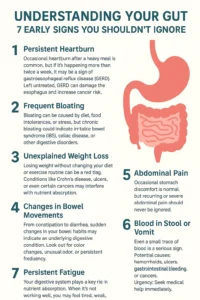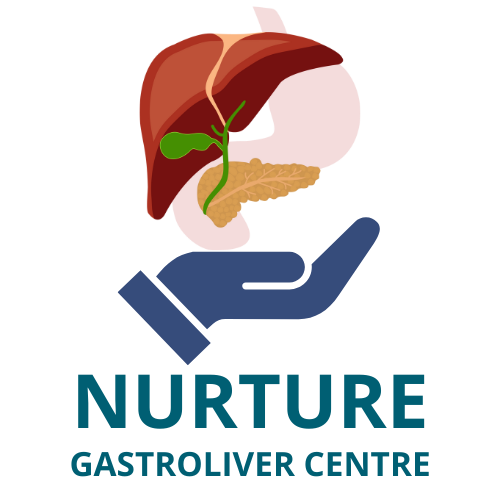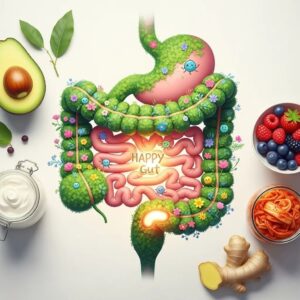Your gut health is vital for your overall well-being. Learn 7 warning signs that could indicate digestive problems and when to see a specialist.
Introduction
Your digestive system is more than just a pathway for food — it’s a powerhouse that affects your immunity, energy, and overall health. Often called the “second brain”, your gut can send warning signs when something isn’t right. Recognizing these symptoms early can help prevent more serious problems down the line.

Here are 7 early signs your gut might need medical attention.
1. Persistent Heartburn
Occasional heartburn after a heavy meal is common, but if it’s happening more than twice a week, it may be a sign of gastroesophageal reflux disease (GERD). Left untreated, GERD can damage the esophagus and increase cancer risk.
When to see a doctor: If over-the-counter remedies don’t help or symptoms disrupt your sleep.
2. Frequent Bloating
Bloating can be caused by diet, food intolerances, or stress, but chronic bloating could indicate irritable bowel syndrome (IBS), celiac disease, or other digestive disorders.
Pro tip: Keep a food diary to track triggers before visiting your specialist.
3. Unexplained Weight Loss
Losing weight without changing your diet or exercise routine can be a red flag. Conditions like Crohn’s disease, ulcers, or even certain cancers may interfere with nutrient absorption.
Act fast: Early diagnosis can make treatment more effective.
4. Changes in Bowel Movements
From constipation to diarrhea, sudden changes in your bowel habits may indicate an underlying digestive condition. Look out for color changes, unusual odor, or persistent frequency.
Possible causes: Infections, IBS, inflammatory bowel disease (IBD).
5. Abdominal Pain
Occasional stomach discomfort is normal, but recurring or severe abdominal pain should never be ignored.
Could be linked to: Gallstones, ulcers, pancreatitis, or other gastrointestinal issues.
6. Blood in Stool or Vomit
Even a small trace of blood is a serious sign.
Potential causes: Hemorrhoids, ulcers, gastrointestinal bleeding, or cancers.
Urgency: Seek medical help immediately.
7. Persistent Fatigue
Your digestive system plays a key role in nutrient absorption. When it’s not working well, you may feel tired, weak, or low on energy, even after adequate sleep.
Possible link: Malabsorption conditions like celiac disease or chronic liver disease.
Prevention & Healthy Gut Tips
- Eat a diet rich in fiber, fruits, and vegetables
- Stay hydrated
- Limit alcohol, caffeine, and processed foods
- Manage stress with regular exercise and mindfulness
- Schedule regular preventive screenings
Why Early Action Matters
Ignoring gut symptoms can lead to more severe conditions that are harder to treat.
At Nurture Gastroliver Centre, our team uses state-of-the-art technology and a patient-first approach to diagnose and treat digestive and liver problems efficiently and comfortably.

